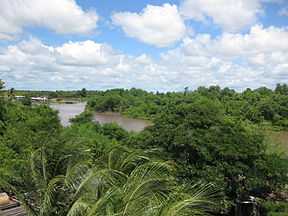Canje River
| Canje River | |
|---|---|
 | |
| Location | Guyana |
The Canje River, located in northeastern Guyana, is the main tributary of the Berbice River. It runs roughly parallel to the Atlantic Ocean coast.
The Dutch established an outpost, Concordia Post, on the river. In 1763 a slave revolt began on two plantations on the Canje River.
The Canje River supplies water to the Guyana Sugar Corporation's Skeldon Estate (c. 12,000 acres (49 km²)); Albion Estate (20,000 acres (80 km²)); and Rose Hall Estate (12,000 to 14,000 acres (49 to 51 km²)). The Manarabisi Rice Cultivation (17,000 acres (69 km²)) and Black Bush Polder (17,000 acres (69 km²)) also depend on this river.
Pumps have been placed along the Canje River that lead to the cultivation area. There are two pumps at Skeldon. These push the water to the 8-mile (13 km) long Sandaka Canal then into the sugarcane cultivation area.
At the 7-mile (11 km) long Manarabisi Canal there are two pumps and three pumps at the 7 mile (10 km) long Black Bush Polder.
When all these pumps are in operation during the irrigation season, the level of water in the Canje River drops and a sufficient volume of water cannot be supplied. At this point, the gate on the Berbice River end of the Torani Canal is opened to allow for flow into the Canje Creek.
The Hoatzin is known in Guyana as the Canje Pheasant, relating to its presence in the river.
Coordinates: 6°15′43″N 57°31′11″W / 6.2619°N 57.5198°W